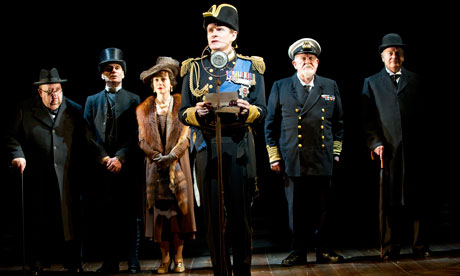
Watching David Seidler's play induces a strong sense of deja vu. That's not simply because it was the source of a hugely successful, Oscar-winning film. It is also because Seidler's perfectly enjoyable play taps into our recollections of other, more resonant works.
Until I saw it on stage, I had not realised how much Seidler's piece owed to Alan Bennett's The Madness of George III. In both we see an embattled royal subjected to all kinds of curative humiliations by a rogue outsider: in Bennett's play it was a bluff Lincolnshire parson whereas in Seidler's it is a tough Aussie speech specialist in the shape of Lionel Logue. I was also reminded of Tom Murphy's outstanding 1983 play, The Gigli Concert, in which a charlatan English therapist gives a Dublin businessman the self-confidence to believe he can sing like the great Italian tenor. In much the same way, Logue endows the stammering future George VI with the ability to speak to, and for, the nation.
It is a cracking good story and Seidler deserves credit for seeing its dramatic potential. And, even if the result often seems like a screenplay, the stage version allows Seidler more room to explore the story's political background. We are made more aware of the threat posed in 1936 by the Duke of York's brother, Edward VIII, not simply through his enthralment with Mrs Simpson but also because of his fascination with European fascism. The play reminds us, far more explicitly than the film, that he admired Hitler on the grounds there were "no Jews or communists in Germany".
But, having gone so far, I wish Seidler had gone further: in particular in his portrait of Winston Churchill. It is grudgingly conceded that Churchill supported Edward VIII. But Seidler underplays Churchill's machinations in 1936 that would have seen him become leader of "a King's party" that would have opposed Stanley Baldwin's government and torn the country apart. Even a sympathetic biographer like Roy Jenkins calls it one of "the most foolish episodes" in Churchill's long life.
But the nub of the play lies in the relationship between the stammering Bertie and the therapeutic Lionel which works better than in the film because we get more detail: at one point, for instance, we see Lionel persuading Bertie's wife to sit on her husband's stomach to stimulate his breathing. Charles Edwards also doesn't bear the distracting resemblance to Nick Clegg of the film's Bertie (Colin Firth) and gives an even sharper account of the duke's unpredictable temper and emotional isolation. Edwards, who has been edging towards stardom for several seasons, has now unequivocally arrived.
Jonathan Hyde also brings out the actorish side of Logue's personality and his delight in being the king of his own particular castle. And, even if the supporting roles are sketchily written, they are lent extra substance by Emma Fielding as the doughty future queen, Michael Feast as a vainglorious Archbishop of Canterbury who saw himself as a national leader in time of crisis, Ian McNeice as the side-shifting Churchill and Joss Ackland as the formidable George V. Adrian Noble also directs with visual elan, making good use of a revolving picture frame and interpolated film to suggest that we are watching, as indeed we are, glimpses of history.
I still think Seidler could have dug deeper into the political context but I suspect his play will be a commercial hit. Royalists will enjoy its portrait of a king emerging triumphant while republicans will savour the irony that the monarchy's survival depended on a failed actor from Adelaide.

